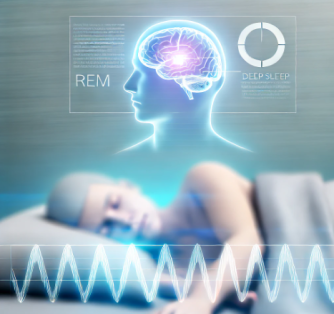Menu
Weight loss
Hormones
Sex
EXPLORE
MEET NU IMAGE MEDICAL
TREATMENTS
MEET NU IMAGE MEDICAL
TREATMENTS
MEET NU IMAGE MEDICAL
How does trazodone work and impact sleep patterns?


Trazodone is widely known for its off-label use as a sleep aid, but how exactly does it help improve sleep? If you've been searching for answers on how trazodone works to address insomnia and other sleep disturbances, this article will provide a clear, detailed explanation. We'll explore how trazodone affects sleep patterns, its impact on sleep architecture, and why it has become an option for many dealing with sleep disturbances.
How does trazodone impact sleep?
Trazodone belongs to a class of medications known as serotonin modulators. Its primary function is to increase the availability of serotonin in the brain, a neurotransmitter that plays a role in regulating mood and sleep. By enhancing serotonin activity, trazodone may help stabilize sleep-wake cycles, making it easier for individuals to fall asleep and maintain restful sleep throughout the night. Additionally, some studies suggest that trazodone may increase the duration of slow-wave sleep (SWS), the most restorative phase of sleep, which is important for both physical recovery and cognitive function. The impact of trazodone on SWS is particularly beneficial for individuals with conditions like chronic insomnia, where sleep fragmentation and reduced sleep efficiency are common.
Understanding sleep architecture and trazodone's effects
To understand how trazodone impacts sleep, it's essential to grasp the concept of sleep architecture, which refers to the structure and pattern of sleep cycles. Sleep is divided into several stages, including Rapid Eye Movement (REM) sleep and Non-Rapid Eye Movement (NREM) sleep, each playing a role in overall sleep quality.
Effects on REM and NREM sleep
Research has indicated that trazodone may have a notable impact on REM sleep, often reducing the time spent in this stage while increasing the duration of deep NREM sleep, particularly Stage 3, also known as slow-wave sleep (SWS). This stage is considered one of the most restorative phases of sleep, contributing to physical recovery, memory consolidation, and overall cognitive function. The enhancement of SWS through trazodone has shown potential benefits for individuals with conditions like chronic insomnia, where sleep fragmentation and reduced sleep efficiency are common. Additionally, trazodoneâs ability to modulate serotonin levels plays a role in stabilizing these sleep patterns.
Impact on sleep latency and duration
One of the most immediate effects of trazodone is its potential to reduce sleep latencyâthe time it takes to fall asleep after getting into bed. By modulating serotonin levels, trazodone may help to calm the mind, making it easier to drift into sleep. Additionally, it might increase total sleep duration, supporting the achievement of sufficient rest to function optimally during the day.
The mechanism behind trazodone's sedative effects
Trazodone's sedative effects are primarily due to its antagonistic action on certain receptors in the brain, such as the H1 histamine receptors and alpha-1 adrenergic receptors. By blocking these receptors, trazodone reduces arousal and alertness, facilitating a smoother transition into sleep. This mechanism is distinct from other sleep medications, such as benzodiazepines, which work by enhancing the effects of the neurotransmitter GABA.
Citing studies and reliable sources
Several studies have examined the efficacy of trazodone as a sleep aid. For instance, research published in the Journal of Clinical Psychopharmacology explored how trazodone may improve sleep quality in patients with chronic insomnia, particularly by enhancing slow-wave sleep and reducing the frequency of nighttime awakenings. The study on trazodone and sleep quality provides insights into its benefits for individuals struggling with sleep disturbances. Another study published in Psychopharmacology looked into the effects of trazodone on sleep disturbances and suggested that it could be effective without the same risk of dependency associated with other sleep aids.
The benefits of using trazodone for sleep
While the primary use of trazodone is as an antidepressant, its potential benefits as a sleep aid are noteworthy. Here are some of the possible advantages:
-
Non-addictive: Unlike some traditional sleep medications, trazodone is not typically associated with the same risk of dependency, making it a candidate for long-term use under medical supervision.
-
May improve sleep quality: By potentially promoting deep, restorative sleep, trazodone could help improve overall sleep quality, contributing to better physical and mental health.
-
Reduces nighttime awakenings: Trazodone might help reduce the frequency of waking up during the night, promoting a more continuous and refreshing sleep experience.
Trazodone's role as a sleep aid is connected to its ability to modulate serotonin levels and influence sleep architecture. By promoting deeper, more restorative sleep and reducing sleep latency, trazodone offers a possible solution for those struggling with sleep disturbances.ÃÂ
If you're considering Trazodone as a solution for your sleep issues, Nu Image Medical offers a convenient and safe way to get started. Through our digital physician visit, you can receive a prescription for Trazodone if medically appropriate. Our process is designed to be quick and easy, ensuring you receive the care you need without the hassle.
Ready to improve your sleep?
Get started with your digital visit today and take the first step toward better rest with trazodone from Nu Image Medical.
This article is for informational purposes only and does not constitute medical advice. The information contained herein is not a substitute for and should never be relied upon for professional medical advice. Always talk to your physician about the risks and benefits of any treatment. Nu Image Medical may not offer the medications or services mentioned in this article.
